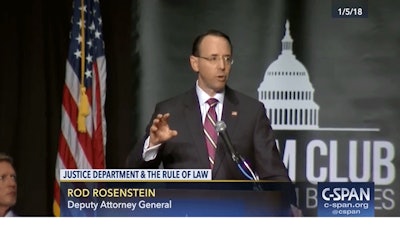
Ever since U.S. Attorney General Jeff Sessions repealed the Obama-era policies hat shielded state-legal marijuana operators from federal prosecution, there’s been a great deal of public debate over what, precisely, that move will mean for the cannabis industry. Last week, we chronicled the statements from U.S. attorneys in states were marijuana is legal for medical or recreational purposes. Those attorneys hedged their words and agreed to follow U.S. Department of Justice guidance.
In more specific remarks, Deputy U.S. Attorney General Rod Rosenstein spoke earlier this month at the Forum Club of the Palm Beaches in West Palm Beach, Fla. Among many topics, Rosenstein answered a question about U.S. Attorney General Jeff Sessions’ recent repeal of the Cole Memo.
This C-SPAN clip covers the relevant portions of Rosenstein's speech. We’ve transcribed the audio below.
How does the DOJ plan to criminalize state-sanctioned marijuana dispensaries? How is that going to change now?
"So that’s a very topical question. Somebody’s been reading the news. There was an announcement yesterday about a change in public policy, and let me explain: This, for us, is a rule of law issue. The attorney had made it very clear that he personally believes that marijuana is a dangerous substance. That’s a very common view. There are differences of opinions about it, but that’s a decision about the merits—whether you think marijuana should or should not be legal. You’re free to have an opinion about that.
"But I talked earlier about the difference between facts and opinions; the facts are that the United States Congress has decreed that marijuana is unlawful—throughout these United States of America, every one of these 50 states. And no state or local government has the authority to overrule federal law. And so, although there are states that have decriminalized marijuana for certain purposes and purport to be regulating it for medical purposes or what they call recreational purposes – whatever purposes—it has never been the case that it’s legal. It’s very confusing. It’s confusing for my teenage daughters when I try to explain this to them.
"But, you know, consider, for example, if the federal government decreed that the speed limit is 65 mph, and the authorities in Palm Beach didn’t like that and they said that in our portion of the highway, the federal highway coming through Palm Beach, the speed limit shall be 85. We won’t pursue anybody who goes up to 85 mph. You can say whatever you like, you know, but the federal law still rules. That’s a rule of law question.
"Now, somebody’s clapping because they agree with me on the policy question, but I’m speaking to you about the rule of law issue. That’s the fact. And so that’s the challenge for us. The thing that the attorney general’s done—and while it’s consistent with his view and mine that it’s bad as a moral matter, bad as a practical matter to use marijuana—the issue here is that it’s simply illegal to do it.
"What the attorney general has done is simply to say that the Department of Justice has full discretion to enforce the law. It doesn’t say which cases we’re going to prosecute, it says we’re going to treat marijuana just like every other substance.
"An analogy you might consider is gambling, where Congress has decided to leave it to the states to make individual decisions about whether or not to allow gambling—and that’s fine. Each state is free to make their decision. They have not made that decision regarding marijuana. They decided that it’s illegal everywhere.
"And so, what the attorney general said … the policy doesn’t dictate that our U.S. attorneys are going to go out and prosecute people for using marijuana. In fact, there are almost no federal prosecutions for mere use or personal possession of marijuana. Our federal prosecutors are busy prosecuting larger-scale cases. But what the attorney general’s done in this new policy is simply to say—there have been a number of memos written about this by department officials who are trying to grapple with this issue, and they were misinterpreted to suggest somehow that the Department of Justice has overruled the Congress. And what the attorney general’s said is that’s not the case—our U.S. attorneys are free to prosecute violations of the law involving marijuana just like all other substances. And what they’re going to do is what they do in all cases: evaluate the facts and circumstances and decide whether a particular case warrants prosecution. And so, as I said, it’s important to distinguish, whether you agree with the policy result—marijuana should or shouldn’t be legal—our job in the department is to respect the fact that it is unlawful under federal law."
Top image courtesy of C-SPAN


























